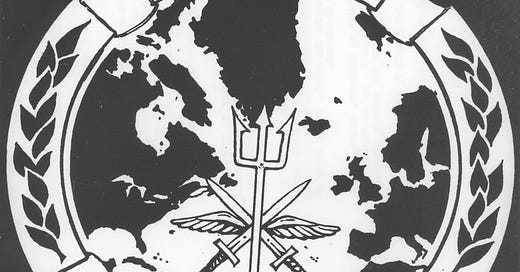NATO’s Do-Something-Ism
When a governmental institution outlives its mission, the institution often discovers the entrepreneurial spirit to fit somewhere else. NATO follows the pattern: with the collapse of the USSR, it became power in search of a purpose, looking to “Do Something.” Distortions formed and compounded.
The first distortion is that The EU has a larger economy than the USA, but the USA pays most of NATO’s defense bills.
The second is that NATO (the USA, really) exists to protect Europe from what? That question was never answered after the USSR disintegrated. Eastern Europe is a thousand kilometers from the North Atlantic (the NA in NATO). And there is plenty of evidence that NATO’s lack of definition, with its advancement eastward, by Doing Something, had much to do with driving today’s Russian revanchement. Chris Hedges, then the principal New York Times columnist covering the old USSR, reminisces that not one security expert he knew during the fall of the USSR, thought that NATO would expand to border Russia. Realpolitik thinkers are right to compare it to what America’s response would be if China formed an alliance with Mexico.
NATO’s role-seeking might have been of some use: by doctrine it is committed to the UN’s principle of Responsibility To Protect (RTP), but in practice the UN has been aloof to the dozens of human rights crises in the post-USSR era. Which range from the virtually unnoticed one going on right now in the Tigray part of Ethiopia to the one that happened in Ethiopia a generation before (remember Live Aid?). Blackhawk Down might have been Luftwaffe Down. Bill Clinton’s lamentations over Rwanda’s neglect might have come from any leader of the EU area. NATO provided only the thinnest assistance to the project to civilize Afghanistan (which they might still do, the Afghans are starving to death).
NATO has also been a cure worse than the disease (besides being a cure for no known disease): its leadership botched a humanitarian intervention in Libya by creating a worse one (and botched the casus belli to boot: the intelligence of an impending crisis was wrong.
NATO’s rigid, institutional thinking also underestimates how easily defensive arrangements can be created quickly when the threat is not abstract: the global response to Saddam’s invasion of Kuwait, for example. Finland and Sweden appear fast-tracked to join NATO.
A blinkered bureaucracy led to NATO not being able to just come out and write down on a piece of paper that Ukraine was not eligible for membership in the foreseeable future (because of treaty legalisms… or something... a meaningful answer was never offered). They had months to diffuse this crisis, with the Russian military buildup observable in real time to anyone with internet access. The “defensive alliance” was thus provocative, failing to avert war and toothless in action when the war came. Ukrainians now agree they will never join NATO in any case. A square-one we might have arrived at without the worst war in Europe since World War Two (and counting).
NATO planners also seem to have greatly underestimated how modern defensive systems have made their grand plans into historical anachronisms. No expert from the national security bureaucracy of any of the NATO states correctly predicted Ukraine’s ability to defend herself without any help from their apparatus. The advanced weapons that have poured into Ukraine, which have defined events on the ground, came from NATO and non-NATO countries alike. The USA is poised to resurrect Lend-Lease, a device that saved Europe decades before NATO existed.
The most dangerous distortion is that this war might have been contained to the Eastern European region, with a euro-centric response. But NATO can’t contain the conflict because they need America’s global capability because they have all but abandoned their own. Global capability brings with it the risk of global conflict expansion, involving Mutually Assured Destruction combatants, climbing escalation ladders, which is where we are now. Nuclear tensions this high came [perilously close to killing us all more than once.
Then there is the fiscal distortion: the United States is the most indebted nation in the history of mankind (and a big portion of that came from prodigal militarism). We simply can no longer afford to defend economies richer than we are. And if altruism were our objective, the dozens of aforementioned human rights catastrophes are needier for funding. To defend the EU we have to pick up, say, an M1 tank from where it’s made in Lima, Ohio, and freight it across thousands of kilometers to a heavy capacity port. Then ship it across an ocean. And then freight it across umpteenth Euro-area nations so that the tank can face the Russians on the Polish frontier. An M1 tank weighs upwards of 70 tons. Imagine the bill for shipping it. The Euros should pick up that burden.
We also have very big defense fish to fry with an emerging China (now proven unambiguously hostile). The Euros will not be helping us contain them. Our Grand Strategy going forward should be naval power to guarantee freedom of commerce across the seas. That’s sufficient service to the “rules based international order” (generous, even).
We should use this opportunity to end the NATO’s Do Something distortions (while, somehow, managing to do nothing productive), now that they have a mission of undeniable clarity.
Hopefully we will have a future, free of a nuclear miscalculation, in which to make the change. Libertarians would find “bureaucrats looking for something to do, haplessly triggered World War 3,” a predictable epitaph for our civilization.






